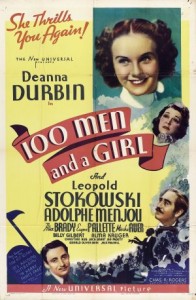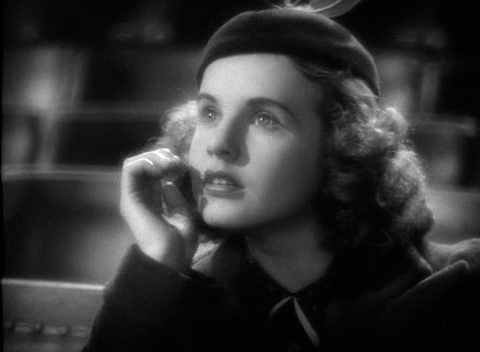“Maybe we need more orchestras!”
|

Synopsis:
The daughter (Deanna Durbin) of an out-of-work classical trombonist (Adolph Menjou) convinces a wealthy socialite (Alice Brady) to fund the creation of a new orchestra — but when Brady’s husband (Eugene Pallette) finds out, he refuses to let the scheme move forward; meanwhile, the great conductor Leopold Stokowski is equally adamant in his refusal to help Durbin or her father.
|
|
Genres, Themes, Actors, and Directors:
- Adolph Menjou Films
- Deanna Durbin Films
- “Let’s Put On a Show!”
- Musicals
Review:
Deanna Durbin’s follow-up to her breakthrough role in Three Smart Girls (1936) was this hyperkinetic fairytale about a can-do teen with enough tenacity and persistence to overcome literally any obstacle placed in her way. For Depression-era audiences, a story about how nearly impossible it is for the have-nots to gain access to a world of employment and privilege must have felt right on target, but today the film simply comes across like a Vehicle — both for Durbin (who, naturally, is asked to sing a few random songs) and for Stokowski (who, naturally, gets to conduct a few pieces with his orchestra). While there’s something undeniably admirable about Durbin’s fearless performance (she rarely pauses to take a breath), her character eventually wears on one’s nerves; she’s like Judy Garland in overdrive, minus the vulnerability. All film fanatics should be familiar with Durbin’s work, given what an erstwhile phenomenon she was — but I recommend sticking with Three Smart Girls instead.
Redeeming Qualities and Moments:
- Deanna Durbin’s enthusiastic (if ultimately wearying) performance as Patsy

Must See?
No; this one is really only must-see for Durbin enthusiasts.
Links:
|
One thought on “One Hundred Men and a Girl (1937)”
First viewing. Unless you’re a classical music fan who is curious to see Stokowski conducting (and revealing that he can’t act; but then, he doesn’t have to act: he’s Stokowski) …skip it.
What may have played well-enough in 1937 for Durbin fans is simply close to unwatchable now, it’s so dated. It just doesn’t play well – even as light entertainment. Some of it (in the writing and direction) is even noticeably clumsy.
The comment above about Durbin’s performance is accurate: “…her character eventually wears on one’s nerves; she’s like Judy Garland in overdrive, minus the vulnerability.” When she isn’t singing (rather well – if you’re partial to an operatic voice), she’s mostly screeching, screaming or is generally annoying.
I disagree that film fanatics need to be familiar with Durbin’s work – except for her interesting, atypical performance in Siodmak’s ‘Christmas Holiday’ (which I strongly recommend).